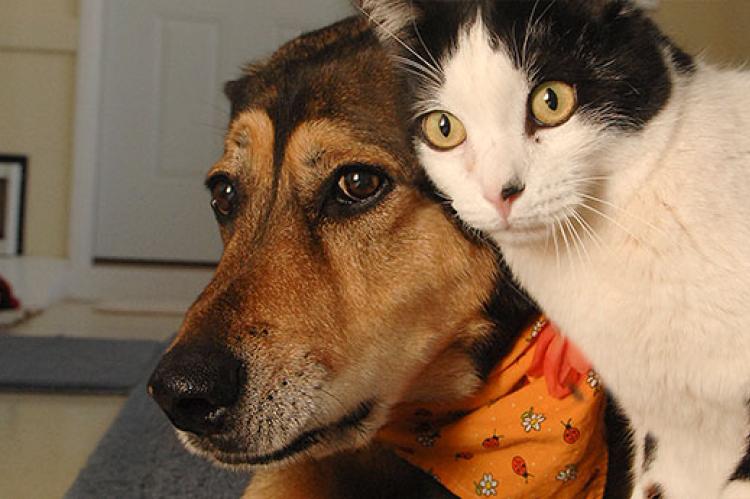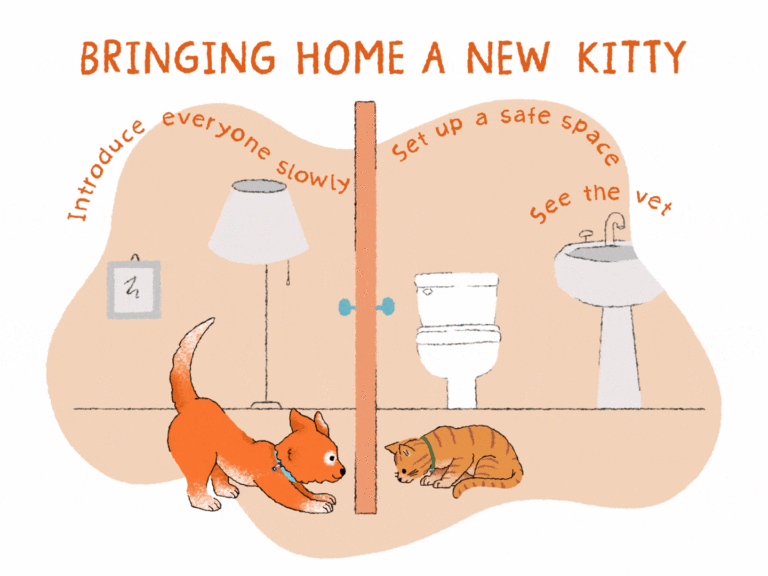Introducing a new dog to a cat requires gradual introductions and scent exchanges. Start by keeping them separated and swapping their bedding or toys to familiarize them with each other’s scent.
Gradually introduce them in a controlled environment and monitor their interactions closely. Reward positive behavior and be patient as they adjust to each other’s presence. Provide separate spaces for each pet to retreat to and ensure they have their own food and water bowls.
With time and positive reinforcement, they can learn to coexist peacefully. Remember to prioritize the safety and comfort of both animals throughout the process.
:strip_icc()/puppy-and-cat-look-at-each-other-through-babygate-167062144-5c3b7b40c9e77c000104ee0a.jpg)
Credit: www.thesprucepets.com
Understanding Pet Dynamics
Introducing a new dog to a cat can be a delicate process, but understanding the dynamics between your pets is crucial for a successful integration. This interaction is the key to allowing them to coexist harmoniously in your home. In this section, we will explore two essential aspects of pet dynamics: natural predatory instincts and the importance of a proper introduction.
Natural Predatory Instincts
Predatory instincts are an inherent part of a dog’s nature. Dogs, especially certain breeds, have a natural inclination to chase small animals, including cats. This behavior stems from their ancestors’ hunting instincts and can pose a significant challenge when introducing a dog to a resident cat.
To minimize potential conflicts and ensure a smooth introduction, it is important to recognize and address these predatorial tendencies. Remember that each dog is different, so some may exhibit a stronger predatory drive than others. Understanding your specific dog’s breed and individual temperament can help you anticipate and manage their behavior.
Awareness of the natural predatory instincts of your dog should guide your initial interactions between your new dog and resident cat. By acknowledging this inherent nature and implementing suitable precautions, you can create a more secure foundation for their future relationship.
Importance Of Proper Introduction
A proper introduction is crucial when introducing a new dog to a resident cat. This initial interaction sets the tone for their future relationship, minimizing stress and potential conflicts between them. Taking the time to introduce them correctly can save you from future headaches and ensure a peaceful coexistence.
Here are some steps to follow for a successful introduction:
- Prepare a designated safe space for your cat, such as a separate room, where they can retreat if feeling overwhelmed.
- Allow your new dog to explore their new environment while keeping the cat securely separated.
- Gradually introduce them to each other’s scents by swapping blankets or using pheromone products to create a familiar atmosphere.
- Supervise their initial interactions through a pet gate or crate to allow them to observe and familiarize themselves with one another without physical contact.
- Once both animals show signs of being comfortable, you can progress to supervised face-to-face interactions in a controlled environment.
Remember, patience is key throughout this process. Vigilantly observe their body language and behavior, stepping in if signs of aggression or discomfort arise. Proceed at a pace that works for both your pets, understanding that each individual is different and may require more time to adjust.

Credit: m.youtube.com
Preparing Your Home
When introducing a new dog to a cat, preparing your home is key to creating a smooth transition. Both cats and dogs can be territorial, so it’s essential to set up separate areas for each pet. This step ensures a gradual and calm introduction, minimizing any potential conflict. Here’s how to prepare your home to introduce a new dog to your cat.
Create A Safe Space For The Cat
Before bringing the new dog home, create a safe space for the cat where it can retreat to feel secure. This could be a designated room or an area with the cat’s bed, litter box, toys, and scratching post. Ensure the space has high perches or hiding spots to allow the cat to observe the dog from a safe distance. Encourage the cat to spend time in this area, gradually increasing their exposure to the dog’s scent and presence.
Set Up A Separate Area For The Dog
Similarly, designate a separate area for the new dog to acclimate to its new surroundings. This area should include the dog’s bed, toys, and food and water bowls. Consider using baby gates or playpens to create a confined space for the dog, allowing the pets to see, smell, and hear each other without direct interaction. This method allows both pets to become familiar with each other’s scent and presence before a face-to-face introduction.
Gradual Introduction
Introducing a new dog to a cat should be done gradually to ensure a smooth transition and minimize stress for both pets. By following a careful step-by-step process, you can help them become familiar with each other and establish a positive relationship. This approach involves gradual exposure and controlled interactions, allowing them to adapt at their own pace.
Start With Scent Exchange
Begin by exchanging scents between the dog and the cat. Place a piece of cloth or a toy with the dog’s scent in the cat’s area, and vice versa. This helps them become accustomed to each other’s smell in a non-threatening way. Gradually, increase the proximity of the scents to each pet’s living space to facilitate familiarity and comfort.
Supervised Visual Introduction
After the scent exchange, initiate a supervised visual introduction. Allow the pets to see each other from a safe distance, such as through a baby gate or a cracked door. Observe their reactions closely to gauge their comfort levels. Reward calm behavior with treats or praise, and separate them if signs of stress or aggression arise.

Credit: resources.bestfriends.org
Positive Reinforcement
Introducing a new dog to a cat can be a delicate process. Positive reinforcement is key when helping them form a bond, allowing them to adjust in a calm and gradual manner. Utilizing treats, praise, and rewards can create a positive association, easing any tension and encouraging a harmonious relationship.
Reward Good Behavior
One of the most effective ways to introduce a new dog to a cat is by rewarding good behavior. When your dog and cat interact positively, it’s essential to show appreciation for their behavior. Rewards can include treats, praise, and petting. By using positive reinforcement, you are encouraging your pets to continue their good behavior and build a strong bond.
Here are some tips for rewarding good behavior:
- Offer treats: Whenever your dog and cat have a pleasant interaction, be sure to offer them a treat that they enjoy. This positive association will make them more likely to engage in positive behaviors in the future.
- Provide praise: Verbal praise is a simple yet effective way to reinforce good behavior. Use a cheerful tone and say phrases like “good dog” or “good cat” to let them know they are doing well.
- Give petting: Dogs and cats love physical affection. After a successful interaction, reward them with a gentle petting session to show your appreciation.
Avoid Punishment
While it’s essential to reward good behavior, it’s equally important to avoid punishment when introducing a new dog to a cat. Punishment can create fear and anxiety, leading to negative consequences in their relationship.
Here are some reasons to avoid punishment:
- Stress and anxiety: Punishment can cause stress and anxiety in both your dog and cat, leading to increased aggression and fear-based behavior.
- Negative association: Punishment can create negative associations between your pets, making it more challenging for them to build a positive relationship.
- Confusion: Punishment can confuse your pets and make it difficult for them to understand what behavior is expected of them.
Instead of punishment, focus on redirecting unwanted behavior and reinforcing positive actions. This approach will foster a safe and harmonious environment for your pets to thrive in.
Building Positive Associations
In order to introduce a new dog to a cat successfully, building positive associations is key. By creating a positive environment and promoting friendly interactions between the two, you can increase the chances of them getting along harmoniously.
Shared Activities
Engaging in shared activities is an excellent way to foster a positive bond between your new dog and cat. By encouraging joint play sessions or walks, you can help them associate each other’s presence with fun and enjoyment. This can gradually help them become more comfortable around one another. Keep the interactions short and supervised initially, gradually increasing the duration as the bond strengthens.
Feeding Time Management
Feeding time can be a potential source of tension between a dog and a cat. To prevent any negative associations, it is crucial to manage their mealtimes effectively. Provide separate feeding areas for both pets, ensuring they are at a safe distance from each other. This way, they can enjoy their meals in peace without feeling threatened or anxious.
If either your new dog or cat finish their meal first, avoid immediately introducing them to the other pet. This will prevent any possible incidents or territorial behavior. Instead, wait for a few minutes before allowing them to interact again.
Frequently Asked Questions Of How To Introduce A New Dog To A Cat
How Can I Introduce A New Dog To A Cat?
– To introduce a new dog to a cat, start by keeping them in separate rooms with their own supplies. – Gradually let them smell and hear each other without direct contact. – Once they seem comfortable, use a visual barrier like a glass door or baby gate to allow them to see each other without touching.
– Allow supervised interaction between them while observing their behavior closely.
What Steps Should I Take To Introduce A Dog To A Cat?
– Introduce the new dog to the cat’s scent by swapping their bedding or rubbing a towel on each of them. – Use a controlled and gradual introduction process by allowing them to sniff each other through a screen or crate.
– Gradually increase their interaction time and make it positive by rewarding good behavior. – Continue supervised interactions until they are comfortable together.
How Long Does It Take For A Dog And Cat To Get Along?
– The time it takes for a dog and cat to get along can vary. Some may establish a bond in a few days, while others may take weeks or even months. – It depends on the individual personalities, past experiences, and the introduction process.
– Patience and proper introduction techniques are crucial for fostering a positive relationship between a dog and cat.
Can A Dog And Cat Become Best Friends?
– Yes, a dog and cat can become best friends with proper introductions, positive reinforcement, and time. – They may develop a bond through play, mutual grooming, or simply coexisting peacefully. – It’s important to provide each pet with their own spaces and resources to ensure a harmonious relationship.
Conclusion
Introducing a new dog to a cat can be a delicate process. By following these steps, you can ensure a smooth transition for both your furry friends. Gradual introductions, providing separate spaces, and using positive reinforcement are key strategies to help them get along.
Remember, patience and consistency are essential during this process. With time and effort, your cat and dog can form a harmonious bond and become best buddies. Happy pet parenting!



